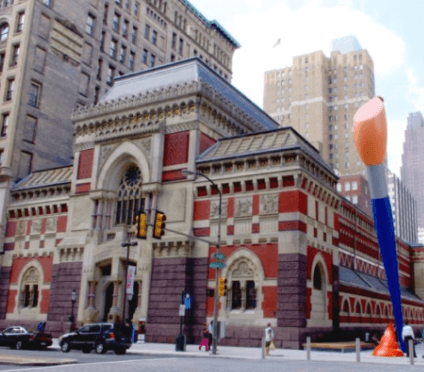Delaney Welsh ’24
In early January of this year, The Pennsylvania Academy of Fine Arts (PAFA) President Eric Pryor announced that the institution will be eliminating their Bachelor’s and Master’s degree programs at the end of the 2024-2025 academic year. As the United States’ oldest art school and art museum, PAFA has served as an epicenter of creativity in the Philadelphia area for over 200 years. According to PAFA, this change is the culmination of educational, financial, and management challenges, and the vote to shut down these programs was unanimous. This news has been received differently among students and faculty of the Episcopal Academy. Some insist that this decision is not one to worry about, while others indicate that this will certainly send a negative message to artists about their value and abilities.

Photo courtesy of Artnet News
David Sigel, Upper School Art Department Chair, reflects on this decision by stating, “I know it is the oldest art school in the United States so it often brings up questions of ‘if this doesn’t survive then what will?’” This uncertainty is valid when recognizing just how far PAFA stretches in the Philadelphia community—specifically in education. PAFA has long partnered with The University of Pennsylvania to provide students with flexible and multifaceted curricula. Even so, Sigel maintains, “I don’t think we need to panic.”
On the other hand, Velina Feuzeu ’24 expresses the importance of PAFA to the culture of our area. As an art student and fashion designer, Feuzeu explores the development of Philadelphia as an emerging center of art, and recognizes the role that PAFA plays in that development. She states, “Pennsylvania and Philly are trying to become good fashion/bigger art places–especially with so many murals and museums.” Having just released her first collection of luxury streetwear, Feuzeu demonstrates a clear understanding of the artistic importance of PAFA’s degree programs. She states, “It is integral, it is important, it is fundamental to who Philly is in our arts to keep the degree program.”
Similar to Feuzeu, Alexandra Chadwick ’24 believes that the elimination of PAFA’s degree programs is doing an injustice to artists and possibly limiting their expression. Chadwick, Editor of Episcopal’s art magazine, The Epolitan, states, “I think that is sad to hear. I feel like art programs give a lot of opportunities for people to branch out and explore new things without having to conform to traditional academics.” Chadwick’s observations align with the mission statement of PAFA, which highlights “…expanding the stories of American art through its collections, exhibitions, and programs.” PAFA’s mission statement goes on to promote the cultivation of, “…innovative makers and critical thinkers with a deep understanding of traditions and the ability to challenge conventions.”
Chadwick further recognizes that this news, “… might send a signal to artists that they’re not as valued in the academic community.” She continues, “I feel like it is something that society is constantly telling people: artists aren’t as valued, and you cannot really produce much with an art degree.” Chadwick maintains that this is not the truth, and that PAFA’s degree programs were an example of somewhere where artists could “explore new mediums.”
The Pennsylvania Academy of Fine Arts assures that they will continue their other educational programs, and dedicate more attention to their museum. In light of these developments, David Sigel reminds us that, “…everything is cyclical, we have a strong and vibrant arts center here in Philly and there are still amazing places where you can go to learn about art. This is just a little blip in the map of how culture and society think about the arts and values the arts.”